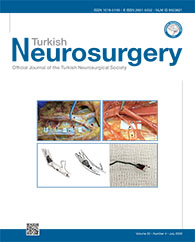2Selcuk University, Faculty of Medicine, Department of Neurosurgery, Konya
3Selcuk University, Faculty of Medicine, Department of Pathology, Konya DOI : 10.5137/1019-5149.JTN.27692-19.6 AIM: To determine the clinical and radiographical aspects of six patients diagnosed with pericallosal lipomas (PCL).
MATERIAL and METHODS: A retrospective analysis of patients who presented to the neurosurgery outpatient clinics of Selcuk Faculty of Medicine between 2009 and 2019, revealed that six patients were diagnosed with PCL. The clinical and magnetic resonance imaging (MRI) data were obtained by reviewing patients? records.
RESULTS: A total of six patients (two girls and four boys), with a mean age of 53.8 months (38?72 months), were included in this study. They were followed up for a mean period of 36.5 months (32?41 months). PCL were detected on MRIs, which were obtained to investigate headache in two patients, epilepsy in one patient, frontal dermal sinus tract and left frontal epidermoid tumor in one patient, and subcutaneous lipoma associated with PCL in one patient. Five patients displayed tubulonodular lipomas and one patient displayed curvilinear lipomas. Agenesis or dysgenesis of the corpus callosum (CC) was observed in four (66%) patients. Two patients received surgical treatment for cosmetic skin problem.
CONCLUSION: Because of the benign course of PCL, i.e. no growth or very slow growth, and close proximity to the surrounding neurovascular structures, surgical removal should be considered only in symptomatic PCL. Furthermore, other malformations and anomalies may accompany PCL.
Keywords : Pericallosal lipoma, Corpus callosum agenesis, Corpus callosum dysgenesis




